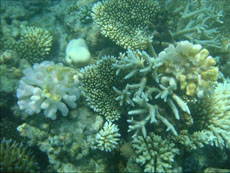Coral bleaching affecting Maldives

The Maldives is now suffering the most serious incidence of coral bleaching since the major 1998 El Niño event that destroyed most of the country’s shallow reef coral.
Coral bleaching is caused when rising water temperatures stress the coral, leading it to expel the algae it uses to get nutrients. When water temperatures rise even slightly, algae leave the coral polyp and enters the water column, causing the coral to lose its colour and eventually die.
Reports of bleaching have been trickling in from marine biologists and researchers across the country.
Hussein Zahir from the Marine Research Center (MRC) has collected reports of the bleaching, and said that based on his estimates, “10-15 percent of shallow reef coral is now completely white, while 50-70 percent has begun to pale.”
Zahir noted that temperatures this year were following similar patterns to those of 1998, with a surface temperature in April of one degree above the long-term average.
Senior Marine Biologist Guy Stevens, based at the Four Seasons Resort in Landaa Giraavaru, said that he had noticed that bleaching was beginning to occur last year “after a change in the weather linked to El Niño. The last one in 1998 was pretty catastrophic, and reefs in the Maldives have been recovering ever since.”
In the meantime, both Stevens and Zahir noted that there was little that could be done to prevent further bleaching but that recent cooler temperatures may have averted disaster. In addition, they also observed that the tourism industry appeared to have been in no hurry to report that bleaching was occurring.
“That’s something the resorts obviously don’t want to publicize,” Stevens commented. “But I don’t think it’s any good burying our heads in the sand, when there’s isn’t going to be any sand left to bury our heads in.”
The artificial coral breeding programs run at many resorts were well-intentioned, “but rather like putting a band-aid on a gushing wound.”
“It doesn’t address the issue. Rather [breeding programs] are tools to raise awareness and ease pressure on the local reef. But there are things like sand-pumping that resorts should halt during periods of bleaching because it makes the problem worse,” he added.
“Otherwise there’s very little we can do – it’s really a global issue. We haven’t seen a reduction in fish life, turtles and mantas, and it seems those parts of the ecosystem can survive while the reef structure is at least in place, but overall I think we’re going to see a gradual decline. Coral reefs may be the first ecosystem we’ll lose on our planet.”